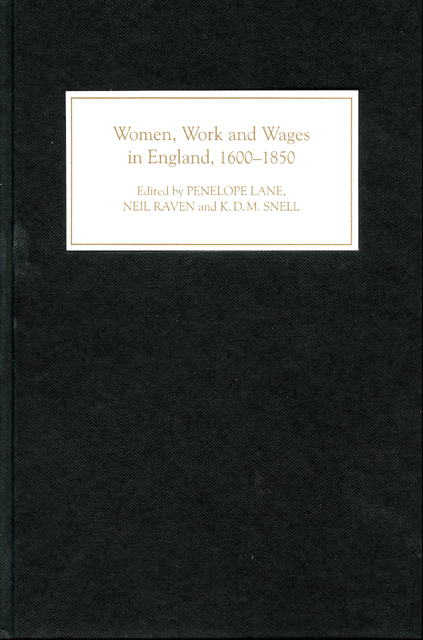Book contents
- Frontmatter
- Contents
- Illustrations
- Notes on Contributors
- Acknowledgements
- Introduction
- 1 ‘Waste’ Children? Pauper Apprenticeship Under the Elizabethan Poor Laws, c. 1598–1697
- 2 Gender at Sea: Women and the East India Company in Seventeenth-Century London
- 3 Sickles and Scythes Revisited: Harvest Work, Wages and Symbolic Meanings
- 4 A Customary or Market Wage? Women and Work in the East Midlands, c. 1700–1840
- 5 ‘Meer Pennies for My Baskitt Will be Enough’: Women, Work and Welfare, 1770–1830
- 6 Caring for the Sick Poor: Poor Law Nurses in Bedfordshire, c. 1770–1834
- 7 ‘A ‘Humbler, Industrious Class of Female’: Women’s Employment and Industry in the Small Towns of Southern England, c. 1790–1840
- 8 A Diminishing Force? Reassessing the Employment of Female Day Labourers in English Agriculture, c. 1790–1850
- Bibliography
- Index
1 - ‘Waste’ Children? Pauper Apprenticeship Under the Elizabethan Poor Laws, c. 1598–1697
Published online by Cambridge University Press: 21 March 2023
- Frontmatter
- Contents
- Illustrations
- Notes on Contributors
- Acknowledgements
- Introduction
- 1 ‘Waste’ Children? Pauper Apprenticeship Under the Elizabethan Poor Laws, c. 1598–1697
- 2 Gender at Sea: Women and the East India Company in Seventeenth-Century London
- 3 Sickles and Scythes Revisited: Harvest Work, Wages and Symbolic Meanings
- 4 A Customary or Market Wage? Women and Work in the East Midlands, c. 1700–1840
- 5 ‘Meer Pennies for My Baskitt Will be Enough’: Women, Work and Welfare, 1770–1830
- 6 Caring for the Sick Poor: Poor Law Nurses in Bedfordshire, c. 1770–1834
- 7 ‘A ‘Humbler, Industrious Class of Female’: Women’s Employment and Industry in the Small Towns of Southern England, c. 1790–1840
- 8 A Diminishing Force? Reassessing the Employment of Female Day Labourers in English Agriculture, c. 1790–1850
- Bibliography
- Index
Summary
Historians have regarded the provision of employment for the labouring poor as the ‘least practical’ of the clauses of the Elizabethan poor laws of 1598 and 1601. Work for the underemployed, it has been argued, proved to be a weaker pillar of policy than either doles for the deserving or whipstocks for the wandering. Despite the implicit recognition in the statutes that the ablebodied poor constituted a ‘pool of badly-managed labour’, parochial work schemes appear to have been successful only intermittently, if at all. The fate of the other employment provision of the welfare regime – the enforcement of pauper apprenticeship at the expense of the parish – has, however, received rather less attention in the seventeenth-century scholarship. Most studies of the binding out of poor children have tended to focus on the eighteenth century, partly due to the increased survival rate of indentures for that period and partly due to the enduring historiographical interest in the settlement laws, with which parish apprenticeship became closely intertwined. Historians of seventeenth-century England have generally been concerned with pauper apprenticeship only as an index of the efficiency of local government. Indeed, so fragmentary is the existing scholarship that the current historiographical orthodoxy, even when stated by so magisterial an authority as Professor Paul Slack, is bound to be impressionistic: in the early seventeenth century, he argues, pauper apprenticeship ‘may have made some modest contribution to dealing with the unemployed bulge in a relatively youthful population’.
This chapter investigates the problems and opportunities presented by the compulsory binding out as apprentices of the children of the labouring poor, focusing not only on the notorious difficulties experienced in coercing recalcitrant masters to accept them but also on the less familiar problem of persuading reluctant parents to let their young go into service In part, it will be argued, these tensions arose from the legal ambiguities of the statutes themselves. Although the poor laws had not explicitly obliged either masters to receive apprentices or parents to give up their children, rulings by the Jacobean and Caroline judiciary emphasised that the statutes implied compulsion.
- Type
- Chapter
- Information
- Women, Work and Wages in England, 1600-1850 , pp. 15 - 46Publisher: Boydell & BrewerPrint publication year: 2004
- 2
- Cited by



